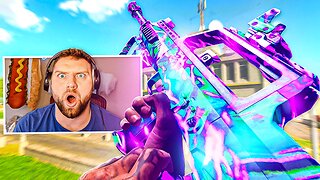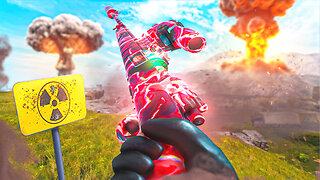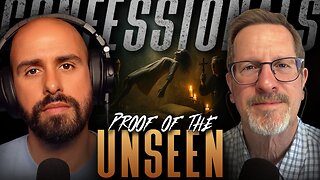Premium Only Content

What Emotion Triggers Adrenaline?
Can you guess which emotion triggers adrenaline?
Healthy Ketogenic Diet and Intermittent Fasting:
▶️ https://youtu.be/vMZfyEy_jpI
▶️ https://youtu.be/mBqpaAKtnXE
Timestamps
0:00 What emotion triggers adrenaline?
0:22 What adrenaline does
1:15 What is the difference between adrenaline and cortisol?
2:55 When adrenaline is a bad thing
4:19 What you can do
5:18 Hypoglycemia and adrenaline
6:12 Bulletproof your immune system *free course!
What emotion triggers adrenaline? Fear. Fear triggers adrenaline.
A few other things that trigger adrenaline are:
• Exercise
• Excitement
• Physical threat
• Hypoglycemia (low blood sugar)
What does adrenaline do?
• It increases the heart rate
• It increases sweating
• It causes vasodilation of the lungs and heart
• It makes the body stronger
• It makes the body more alert
• It increases energy
• It triggers ACTH
Both adrenaline and cortisol prepare the body for a stress state. The difference is that adrenaline takes seconds to kick in, and cortisol can take a few minutes. Cortisol is also more long-lasting, where adrenaline is more short-lived.
Short-term exposure to adrenaline can be a good thing. However, chronic exposure to too much adrenaline can be very bad for the body.
Chronic exposure to too much adrenaline can:
• Burnout the adrenals
• Affect the heart
• Affect your mood
• Decrease your stress tolerance
• Prevent relaxing sleep
Adrenaline is like an on switch for stress. Unfortunately, there’s basically no off switch. If the adrenals are chronically stimulated, over time, the adrenals tend to stay on and can’t turn off easily. This can cause someone to have stress and poor sleep. It can also activate cortisol and can even cause belly fat.
Action steps:
• Turn off stress
• Take vitamin B1, vitamin D3, and vitamin C
• Sleep more
• Take long walks
• Consume a low-carb diet
Hypoglycemia can trigger adrenaline. Insulin can cause hypoglycemia. A high carbohydrate triggers insulin. So, a high carb diet can keep your body in fight or flight mode, activating adrenaline and creating a situation where it can be hard to lose weight. A low-carb diet may help restore normal levels of adrenaline.
Dr. Eric Berg DC Bio:
Dr. Berg, age 58, is a chiropractor who specializes in Healthy Ketosis & Intermittent Fasting. He is the author of the best-selling book The Healthy Keto Plan, and is the Director of Dr. Berg Nutritionals. He no longer practices, but focuses on health education through social media.
Follow us on FACEBOOK: https://fb.me/DrEricBerg
Send a Message to his team: https://m.me/DrEricBerg
ABOUT DR. BERG: https://www.drberg.com/dr-eric-berg/bio
Disclaimer:
Dr. Eric Berg received his Doctor of Chiropractic degree from Palmer College of Chiropractic in 1988. His use of “doctor” or “Dr.” in relation to himself solely refers to that degree. Dr. Berg is a licensed chiropractor in Virginia, California, and Louisiana, but he no longer practices chiropractic in any state and does not see patients so he can focus on educating people as a full time activity, yet he maintains an active license. This video is for general informational purposes only. It should not be used to self-diagnose and it is not a substitute for a medical exam, cure, treatment, diagnosis, and prescription or recommendation. It does not create a doctor-patient relationship between Dr. Berg and you. You should not make any change in your health regimen or diet before first consulting a physician and obtaining a medical exam, diagnosis, and recommendation. Always seek the advice of a physician or other qualified health provider with any questions you may have regarding a medical condition. The Health & Wellness, Dr. Berg Nutritionals and Dr. Eric Berg, D.C. are not liable or responsible for any advice, course of treatment, diagnosis or any other information, services or product you obtain through this video or site.
#keto #ketodiet #weightloss #ketolifestyle
Thanks for watching! I hope this helps you better understand adrenaline, how it’s triggered, and what to do about it.
-
 5:07
5:07
Dr. Eric Berg
15 days agoThis ONE Lie Causes 90% of Chronic Disease
5.95K11 -
 LIVE
LIVE
LFA TV
3 hours agoLFA TV ALL DAY STREAM - WEDNESDAY 8/27/25
5,484 watching -
 1:22:55
1:22:55
Game On!
19 hours ago $2.62 earnedBREAKING NFL NEWS: Taylor Swift and Travis Kelce Are Engaged!
29.9K12 -
 41:04
41:04
Coin Stories with Natalie Brunell
1 day agoCooking, Culture & Crypto: Norma Chu’s Food Empire Turns Bitcoin Treasury
24.8K -
 LIVE
LIVE
JuicyJohns
1 hour ago $0.15 earned🟢#1 REBIRTH PLAYER 10.2+ KD🟢
35 watching -
 1:21:19
1:21:19
JULIE GREEN MINISTRIES
3 hours agoDIRTY POLITICIANS WILL BE ARRESTED AND REMOVED FROM POWER
63.3K197 -
 LIVE
LIVE
GritsGG
2 hours agoWin Streaking! Most Wins 3485+ 🧠
20 watching -
 1:02:09
1:02:09
The Confessionals
22 hours agoThe Supernatural Proof You Can’t Ignore (When Angels and Demons Showed Up) | Lee Strobel
41.3K27 -
 15:24
15:24
Degenerate Jay
22 hours ago $1.10 earned5 Best Moments In Batman: Arkham Asylum
23.4K1 -
 12:24
12:24
The Shannon Joy Show
16 hours ago🔥From Flock Cameras to Palantir: America’s Expanding Digital Cage🔥
23.4K2